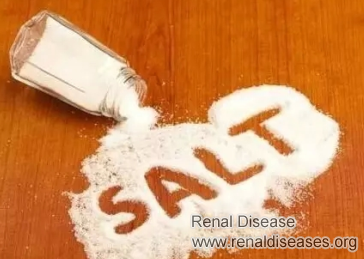Whatsapp: +8615512139310
- Email us:
 Knowing how to take salt properly in the daily life is very important to kidney disease patients. Proper salt intake contributes to the recovery of kidney function. Surely many kidney disease patients will obey the doctor’s advice, namely, low-salt diet. It is a common sense that patients’ salt intake should be controlled within 2~3g, but long-term salt limitation will cause fatigue. In severe condition, patients may suffer hypokalemia. Then, for patients with kidney damage, how to have a scientific and reasonable salt intake?
Knowing how to take salt properly in the daily life is very important to kidney disease patients. Proper salt intake contributes to the recovery of kidney function. Surely many kidney disease patients will obey the doctor’s advice, namely, low-salt diet. It is a common sense that patients’ salt intake should be controlled within 2~3g, but long-term salt limitation will cause fatigue. In severe condition, patients may suffer hypokalemia. Then, for patients with kidney damage, how to have a scientific and reasonable salt intake?
Kidney disease experts point that sodium is mainly in the extracellular fluid, and is responsible for maintaining the osmotic pressure of extreacllular fluid’s crystals. Sodium with water is the mutual interdependence. When sodium level is high, accordingly, the body need to keep more water. The healthy kidneys will discharge more sodium and water. However, due to the disorders of metabolic function, renal disease patients are prone to suffer from disorders of sodium and water. Hence, usually, patients with Swelling and Hypertension should limit salt intake. All in all, the salt intake is very important.
It is better to have a low-salt or salt-free diet patients with high blood pressure and swelling. Salt-free diet can be recommended to patients with early stage of acute nephritis. For patients with chronic nephritis, and severe hypertension, they should keep away from the baking soda and soybean sauce. The length time of avoiding salt should depend on the patients’ specific illness condition. The standard of salt-free diet is the swelling and high blood pressure. For the patients with mild swelling, they can choose low-salt diet. And it is better to avoid the salted eggs, pickles, and canned food.
Of course, long-standing salt restriction also can cause poor appetite. In order to improve the condition, patients can choose some alternative food minerals like ketchup, sesame paste, and Sweet and sour sauce and so on.
All in all, nephropathy patients must have a scientific and reasonable salt ingestion, so as to reduce the damaged kidney’s burden and protect remaining renal function.